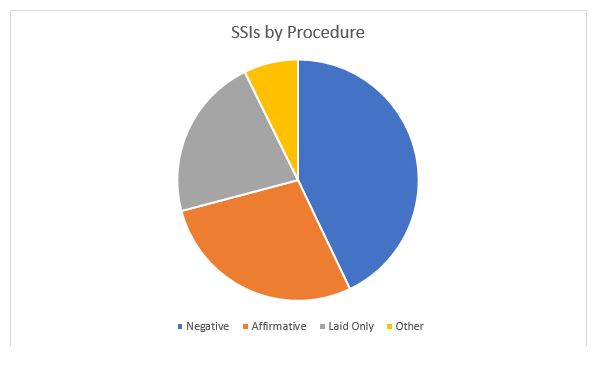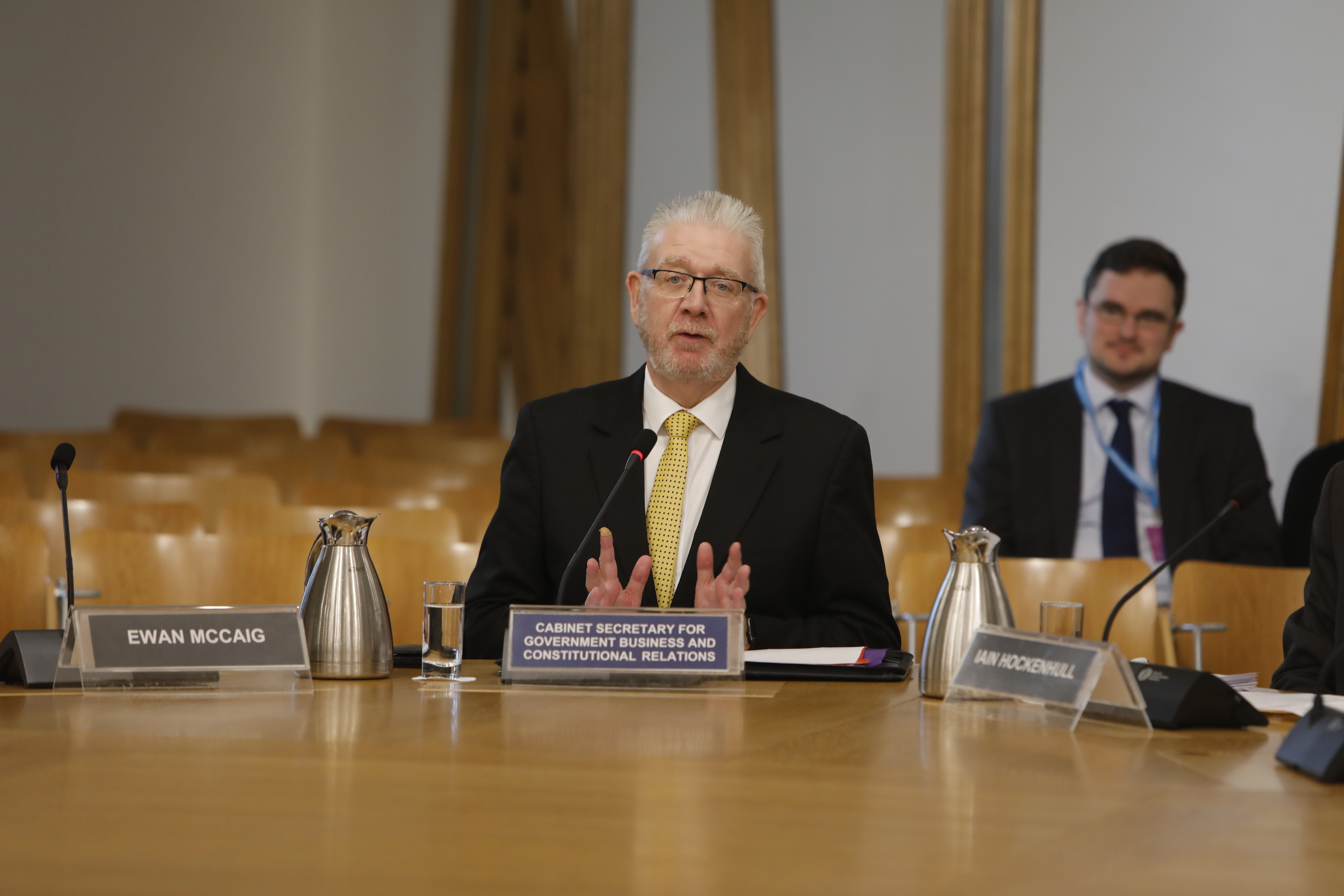Delegated Powers and Law Reform Committee
Delegated Powers and Law Reform Committee Annual Report 2019-20
Introduction
This Report covers the work of the Committee during the parliamentary year from 12 May 2019 to 11 May 2020. The Committee has scrutinised Scottish statutory instruments this year, as well as delegated powers provisions within several bills.

Members of the Committee. Back Row: Gil Paterson and Gordon Lindhurst. Front Row: Mary Fee, Bill Bowman (Convener) and Stuart McMillan (Deputy Convener).
Membership Changes
Previous Members of the Committee during the reporting year:
Alison Harris (from 17 November 2016 to 17 September 2019)
Graham Simpson (from 29 June 2017 to 3 March 2020)
Tom Arthur (from 19 April 2018 to 3 March 2020)
Jeremy Balfour (from 17 September 2019 to 3 March 2020)
Bills
The Committee considers delegated powers provisions in Scottish Government and Members’ bills. It then reports to subject committees and the Parliament on issues such as the scope of delegated powers and whether parliamentary procedure that would apply to subordinate legislation brought under the power would offer the appropriate level of scrutiny.
Through its scrutiny process, the Committee aims to ensure that the appropriate balance between primary and secondary legislation within bills is maintained and that the Parliament will have appropriate scrutiny of subordinate legislation.
Over the reporting period, the Committee has considered and reported on the following 16 bills at Stage 1:
Non-Domestic Rates (Scotland) Bill
Referendums (Scotland) Bill
Female Genital Mutilation (Protection and Guidance) (Scotland) Bill
Consumer Scotland Bill
Period Products (Free Provision) (Scotland) Bill
Scottish Elections (Franchise and Representation) Bill
Disclosure (Scotland) Bill
Scottish Biometrics Commissioner Bill
UEFA European Championship (Scotland) Bill
Scottish Elections (Reform) Bill
Children (Scotland) Bill
Animal and Wildlife (Penalties, Protection and Powers) (Scotland) Bill
Agriculture (Retained EU Law and Data) (Scotland) Bill
Civil Partnership (Scotland) Bill
Forensic Medical Services (Victims of Sexual Offences) (Scotland) Bill
Defamation and Malicious Publication (Scotland) Bill
The Committee also considered and reported on the following 14 bills after Stage 2:
Fuel Poverty (Targets, Definition and Strategy) (Scotland) Bill
South of Scotland Enterprise Bill
Census (Amendment) (Scotland) Bill
Human Tissue (Authorisation) (Scotland) Bill
Management of Offenders (Scotland) Bill
Climate Change (Emissions Reduction Targets) (Scotland) Bill
Transport (Scotland) Bill
Scottish National Investment Bank Bill
Non-Domestic Rates (Scotland) Bill
Referendums (Scotland) Bill
Consumer Scotland Bill
Disclosure (Scotland) Bill
Scottish Biometrics Commissioner Bill
UEFA European Championship (Scotland) Bill
Legislative Consent Memorandums
The Committee considered and reported on four Legislative Consent Memorandums (LCMs). LCMs are related to UK Parliament bills which seek to change the law or alter Scottish Ministers’ or the Scottish Parliament’s powers in relation to devolved matters. The LCMs considered and reported on by the Committee were:
Domestic Abuse Bill
European Union (Withdrawal Agreement) Bill
Direct Payment to Farmers (Legislative Continuity) Bill
Coronavirus Bill
Agriculture Bill
The Coronavirus Bill was the first piece of primary legislation to address the COVID-19 pandemic in the UK. While the Committee did not publish a report on the LCM due to an expedited timetable at the UK Parliament, the Convener spoke during the Chamber debate to contribute the Committee’s views.i
Subordinate Legislation
The Committee considered a significant number of instruments this year, working to tight timescales to produce 30 reports covering 261 Scottish statutory instruments.
Of the instruments considered, 73 were subject to affirmative procedure, 112 to negative procedure, and 57 were not subject to any parliamentary procedure.
The Committee also considered 9 provisional affirmative instruments, a code of practice, 4 documents subject to consultation, and one document subject to approval. Additionally it considered 4 instruments subject to "super-affirmative" procedure. These instruments are subject to an initial consultation phase before being brought again before the Parliament as an affirmative instrument.

Brexit
The Committee considered 15 instruments laid under schedule 2 of the European Union (Withdrawal) Act 2018 (“the 2018 Act”). These instruments were considered in terms of the protocol agreed with the Scottish Government and approved by the Committee. The protocol requires each instrument laid under schedule 2 the 2018 Act to be considered in terms of the scrutiny procedure attached to the instrument by the Government and the Government’s assessment of the instrument’s significance in terms of policy impact.
The Committee challenged the Scottish Government’s categorisation of one of these instruments. The Committee recommended that the categorisation be raised from Medium to High significance.
Law Reform
The Committee did not consider any Scottish Law Commission (SLC) bills during this reporting period.
However, the Committee did establish a working group to consider the Presiding Officer's criteria for designating a bill an "SLC Bill" that would then be able to be considered by this Committee. The working group, comprising officials from the Scottish Parliament, Scottish Government and Scottish Law Commission, issued a call for evidence and considered possible options before drawing up its recommendations to the Committee. The Committee considered these recommendations in February and will publish a report on the findings of the working group in the 2020-21 parliamentary year.
Meetings
The Committee met 30 times during the parliamentary year. All of the Committee’s meetings were held in the Scottish Parliament building.
Of these meetings, none were entirely in private and three were entirely in public. The main reasons for taking business in private were to consider the Committee’s approach to delegated powers in bills, to consider draft reports or to consider oral evidence heard earlier in the meeting.

Committee held three evidence sessions during this Parliamentary year:
Michael Russell, MSP, Cabinet Secretary for Government Business and Constitutional Relations on the Referendums (Scotland) Bill and the (10 September 2019)
Graeme Dey, Minister for Parliamentary Business and Veterans on the work of the Committee in parliamentary year 2018-19 (17 December 2019)
Fergus Ewing, MSP, Cabinet Secretary for the Rural Economy on the Agriculture (Retained EU Law and Data) Bill (21 January 2020)
The Committee published 68 reports.

Equalities
The Committee considers equalities issues which can arise under the European Convention on Human Rights (ECHR) and under Community law. It is part of the Committee's remit to draw the attention of lead committees and the parliament to any instrument that, in its opinion, fails to comply with any such requirement.
Gender Diversity Information
Of the 18 witnesses who appeared before the Committee, 28% were female and 72% were male. These witnesses were the three Scottish Government Ministers identified in the previous section and the officials who accompanied them. Although most of the witnesses were therefore chosen by the Scottish Government, and it was a relatively small sample size, the Committee fully acknowledges the gender imbalance of witnesses over the past 12 months.